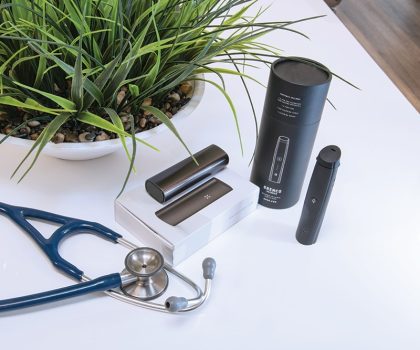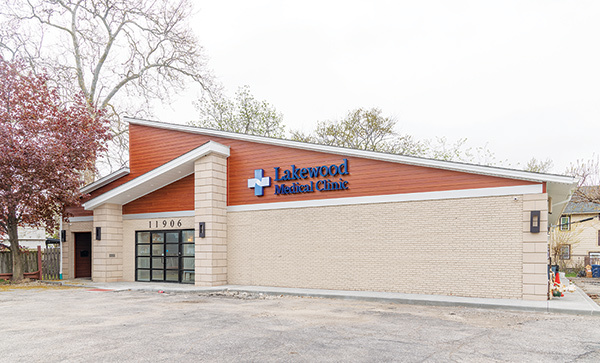More and more Ohioans are finding relief from pain and other symptoms with the help of medical marijuana

By Mitch Allen
Back in 2014, while Dr. Dvora Nelson, of Nelson Vein Clinic, was training a group of doctors about new procedures for treating vein conditions, she overheard one of the physicians commenting about the remarkable benefits of medical marijuana.
She scoffed at him. Yet he insisted the clinical research surrounding the substance and its positive impact on a litany of medical conditions was sound.
“I went home and did my own research, and it took me by surprise,” she says. “I’m a numbers and data person. I won’t believe in something unless it can be measured and proven. I found out he was right.”
So Dr. Nelson went back to school and earned a fellowship with the American Academy of Cannabinoid Medicine in California.
“I went from being someone who bought into the stigma that people only sought medical marijuana to get high, to becoming the person who could bring it to the area as a safe, holistic treatment to complement conventional medicine,” she says. “I want to be an instrument of change. My mission is to destigmatize cannabis so those who so desperately seek relief from medical conditions will find it.”
She opened the Lakewood Medical Clinic last December as well as a location on the East Side, the Maple Heights Medical Clinic, with the help of Lenny Berry, co-founder, president and CEO.

Do You or a Loved One Qualify?
Approved by the State of Ohio, medical cannabis can legally treat 21 qualifying conditions. Some of the more common ones include dementia, cancer, fibromyalgia, PTSD, multiple sclerosis, glaucoma, Parkinson’s, ALS and inflammatory bowel diseases, such as ulcerative colitis and Crohn’s disease.
If you have one of the qualifying conditions and are interested in seeing if medical marijuana is for you, just make an appointment with one of the medical doctors at the Clinic. After meeting with you and going over your symptoms, they’ll write you a recommendation that you take to a certified dispensary—there are 56 in Ohio—to receive your cannabis. Although medical marijuana is not covered by insurance, the cost is often lower than other conventional medications.
Dr. Nelson explains that cannabis contains two main compounds, THC and CBD, each with its own distinct effect on the body.
“Our doctors figure out and recommend the best entourage of cannabis, with higher or lower concentrations of these compounds, to address each patient’s condition,” she says. “Right now, we are recommending our patients consume it by inhaling steam that’s been heated to the proper temperature to release the healing cannabinoids. It’s the best method for someone just starting treatment.”
The doctors at Lakewood Medical Clinic take the time to go over with each patient exactly how to use the vaporizers.
“Our fastest growing demographic group relying on cannabis is patients ages 54 and older,” she says. “Seniors especially seem to understand how it can make pain from age-related conditions go away.”
How Cannabis Works
Dr. Nelson has written several medical papers based on the research she has studied. Here are a few excerpts from them addressing some of the more common conditions that are treated by cannabis therapy:
- Cancer: “Medical marijuana therapy can help alleviate the symptoms associated with cancer and its treatments, while possibly helping to slow the growth of certain cancers. It can decrease nausea, improve appetite and alleviate pain associated with cancer and chemotherapy.
- Dementia: “Medical marijuana has demonstrated efficacy in the treatment of diseases like Alzheimer’s with underlying inflammatory processes. A study found that patients treated with synthetic THC had an improved appetite, less abnormal movement, less agitation and better sleep with less activity at night, much to the relief of their caregivers.”
- Fibromyalgia: “Several clinical trials have demonstrated that using medical marijuana showed statistically significant improvement in the mean reduction of pain and stiffness with improved relaxation and an even higher perception of well-being.”
- Multiple Sclerosis: “MS is a progressive inflammatory disease of the central nervous system caused by the immune system attacking nerve fibers and disrupting the messages the brain sends the body. Symptoms are both cognitive and physical, ranging from anxiety to muscle stiffness and spasms (spasticity) to bladder dysfunction. Cannabis reduces the action of the immune system to improve spasticity and bladder control.”
- Post Traumatic Stress Disorder PTSD: “These patients have suffered a horrifying experience that they relive as if the trauma was happening to them over and over again. Finding the right ratio of THC to CBD is critical for medical marijuana treatment success and can lead to suppression of nightmares and better sleep.”
Lakewood Medical Clinic is at 11906 Madison Avenue in Lakewood. For more information or to schedule an appointment, call 440-809-8450, or visit LakewoodMedicalClinic.com.
